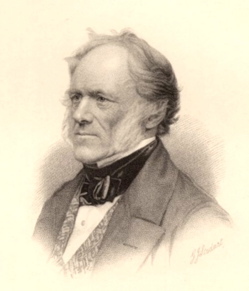Charles Lyell and Charles Darwin
|
|
EUGENE M. MCCARTHY, PHD

|
Charles Lyell (1797-1875), the famed Scottish geologist and paleontologist who named the Pliocene Epoch, befriended the young Charles Darwin (Darwin was 12 years younger than Lyell) and strongly influenced his thought. In particular, Darwin's reading of Lyell's Principles of Geology prompted him to think of evolution as a slow process in which small changes gradually accumulate over immense spans of time.
In this founding document of modern geology, Lyell emphasized natural law. It makes sense, he said, to assume that geological processes acting in the past were much the same as those we see today — forces such as sedimentation in rivers, erosion by wind, or deposition of ash and lava by volcanic eruptions. This is the principle of uniformitarianism, the reasonable assumption that the forces that acted in the past are of the same sort as those we see acting today.
In emphasizing these natural processes, he undermined the claims of earlier geologists many of whom had a distinct tendency to explain geological formations in terms of biblical floods. In the same way, Darwin, who took a copy of Lyell's Principles around the world with him on the voyage of the Beagle, constructed an explanation of the origin of living things in terms of natural processes.
After returning from his trip round the world, Darwin became good friends with Lyell, who advised him on fossils and subjects geological. Lyell also talked extensively with Darwin about his nascent ideas on evolutionary theory and gave him advice on manuscripts.
Charles Lyell and the Delicate Arrangement
Lyell famously came to Darwin's assistance in 1858, when Alfred Wallace threw Darwin into a panic by sending him a full account of the theory of natural selection before Darwin had published anything on the subject. Wallace was on the other side of the world collections specimens in the Malay Archipelago and wanted Darwin to communicate the paper for publication. Lyell and another of Darwin's friends, Joseph Hooker, arranged for Darwin to publish, alongside Wallace's formal paper, an extract from a manuscript and a personal letter in which he had given his own description of natural selection (this was the famous "Delicate Arrangement"). Indeed, if not for the intervention of Lyell and Hooker, it seems likely that we would now refer to Wallace's theory of evolution through natural selection instead of Darwin's.
Read more about Darwin and Charles Lyell >>
Read more about Alfred Wallace >>
Return to Famous Biologists >>
Most shared on Macroevolution.net:
Human Origins: Are we hybrids?
On the Origins of New Forms of Life
Mammalian Hybrids
Cat-rabbit Hybrids: Fact or fiction?
Famous Biologists
Dog-cow Hybrids
Georges Cuvier: A Biography
Prothero: A Rebuttal
Branches of Biology
Dog-fox Hybrids